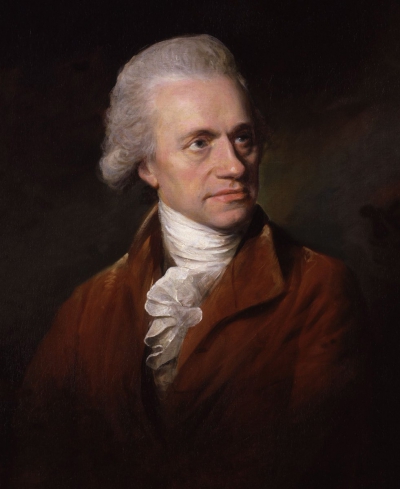Uranus, the seventh planet of the Solar System, has 27 known moons, most of which are named after characters that appear in, or are mentioned in, the works of William Shakespeare and Alexander Pope. Uranus's moons are divided into three groups: thirteen inner moons, five major moons, and nine irregular moons. The inner and major moons all have prograde orbits, while orbits of the irregulars are mostly retrograde. The inner moons are small dark bodies that share common properties and origins with Uranus's rings. The five major moons are ellipsoidal, indicating that they reached hydrostatic equilibrium at some point in their past (and may still be in equilibrium), and four of them show signs of internally driven processes such as canyon formation and volcanism on their surfaces. The largest of these five, Titania, is 1,578 km in diameter and the eighth-largest moon in the Solar System, about one-twentieth the mass of the Earth's Moon. The orbits of the regular moons are nearly coplanar with Uranus's equator, which is tilted 97.77 to its orbit. Uranus's irregular moons have elliptical and strongly inclined (mostly retrograde) orbits at large distances from the planet.William Herschel discovered the first two moons, Titania and Oberon, in 1787. The other three ellipsoidal moons were discovered in 1851 by William Lassell (Ariel and Umbriel) and in 1948 by Gerard Kuiper (Miranda). These five may be in hydrostatic equilibrium, and so would be considered dwarf planets if they were in direct orbit about the Sun. The remaining moons were discovered after 1985, either during the Voyager 2 flyby mission or with the aid of advanced Earth-based telescopes.
Frederick William Herschel (; German: Friedrich Wilhelm Herschel; 15 November 1738 – 25 August 1822) was a German-born British astronomer and composer. He frequently collaborated with his younger sister and fellow astronomer Caroline Herschel (1750–1848). Born in the Electorate of Hanover, William Herschel followed his father into the military band of Hanover, before emigrating to Great Britain in 1757 at the age of nineteen.
Herschel constructed his first large telescope in 1774, after which he spent nine years carrying out sky surveys to investigate double stars. Herschel published catalogues of nebulae in 1802 (2,500 objects) and in 1820 (5,000 objects). The resolving power of the Herschel telescopes revealed that many objects called nebulae in the Messier catalogue were actually clusters of stars. On 13 March 1781 while making observations he made note of a new object in the constellation of Gemini. This would, after several weeks of verification and consultation with other astronomers, be confirmed to be a new planet, eventually given the name of Uranus. This was the first planet to be discovered since antiquity, and Herschel became famous overnight. As a result of this discovery, George III appointed him Court Astronomer. He was elected as a Fellow of the Royal Society and grants were provided for the construction of new telescopes.
Herschel pioneered the use of astronomical spectrophotometry, using prisms and temperature measuring equipment to measure the wavelength distribution of stellar spectra. In the course of these investigations, Herschel discovered infrared radiation.
Other work included an improved determination of the rotation period of Mars, the discovery that the Martian polar caps vary seasonally, the discovery of Titania and Oberon (moons of Uranus) and Enceladus and Mimas (moons of Saturn). Herschel was made a Knight of the Royal Guelphic Order in 1816. He was the first President of the Royal Astronomical Society when it was founded in 1820. He died in August 1822, and his work was continued by his only son, John Herschel.

1787Jan, 11
William Herschel discovers Titania and Oberon, two moons of Uranus.
Choose Another Date
Events on 1787
- 13May
Arthur Phillip
Captain Arthur Phillip leaves Portsmouth, England, with eleven ships full of convicts (the "First Fleet") to establish a penal colony in Australia. - 14May
Constitutional Convention (United States)
In Philadelphia, delegates convene a Constitutional Convention to write a new Constitution for the United States; George Washington presides. - 20Jun
Federal Convention
Oliver Ellsworth moves at the Federal Convention to call the government the 'United States'. - 6Aug
Constitutional Convention (United States)
Sixty proof sheets of the Constitution of the United States are delivered to the Constitutional Convention in Philadelphia, Pennsylvania. - 12Dec
United States Constitution
Pennsylvania becomes the second state to ratify the United States Constitution, five days after Delaware became the first.

 English
English  español
español  français
français  português
português  русский
русский  العربية
العربية  简体中文
简体中文 